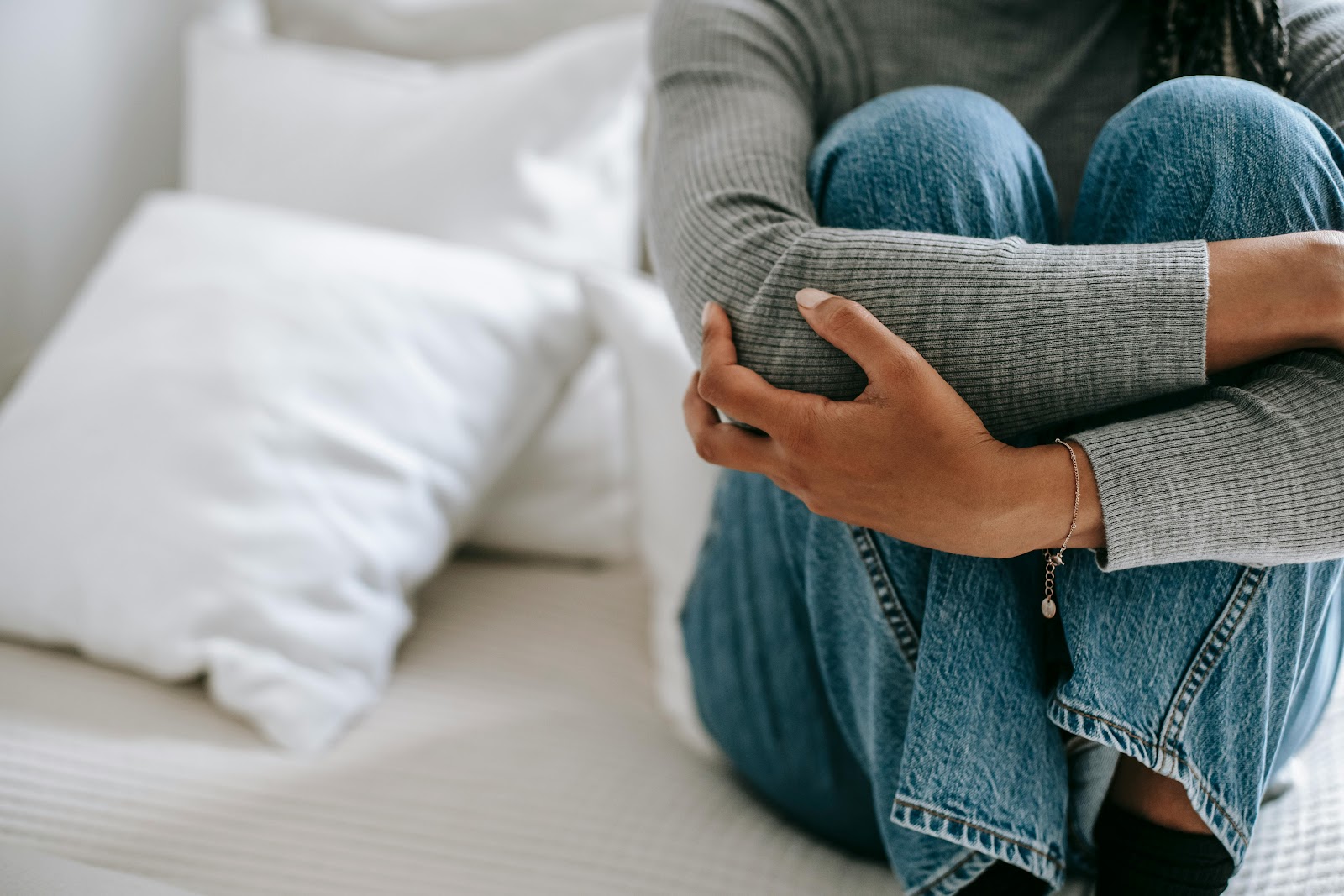The Truth About Postpartum Depression: What Every New Parent Needs to Know
9 minute read
Many people expect the transition into parenthood to come naturally…
That all the parenting instincts you need will effortlessly kick in…that bonding with your baby will happen instantly…that everything will go according to “the plan”…
But the reality is, becoming a parent is the absolute hardest thing many of us will ever do. And bringing home a baby is a life-changing experience that can feel downright impossible at times.
Beyond the Instagram-worthy photos and precious newborn snuggles are the sleepless nights, the unending demands of caring for a baby 24/7, the difficulty that comes with finding your “village” of support, not to mention the hormonal and chemical changes you experience in your body after pregnancy.
This can lead to long-lasting feelings of sadness and other symptoms known as postpartum depression.
What is Postpartum Depression?
Postpartum depression is a long-lasting type of depression that happens in the first year after giving birth. (But it can even begin before you give birth, during your pregnancy.)
It can affect your body physically and emotionally…leading to changes in your mood, behavior, personality.
Postpartum depression can also manifest as a variety of other different depression symptoms like strong feelings of sadness, anxiety, or tiredness. And these symptoms can last for weeks, even months, after giving birth.
How Common is Postpartum Depression? Should I be Worried?
Postpartum depression still carries a stigma that can make it difficult for new parents to talk about or seek out treatment.
But, postpartum depression is actually the most common condition new parents experience after having a baby. In fact, 1 in 8 women experience postpartum depression.
For half of women diagnosed with postpartum depression, it’s their first time to have depression. This means it can be unexpected — especially if you weren’t aware of the risk factors:
- You had depression before or during pregnancy
- You have a family history of depression
- You experienced abuse or adversity as a child
- You had a difficult or traumatic birth
- You had problems with a previous pregnancy or birth
- You have little or no support from family, friends, or partners
- You are now or have experienced domestic violence
- You have relationship struggles, money problems, or experience other stressful life events
- You are under the age of 20
- You have a hard time breastfeeding
- You have a baby that was born prematurely and/or has special health care needs
- You had an unplanned pregnancy
But educating yourself about the signs of postpartum depression is a great way to empower yourself to care for your physical, mental, and emotional health during one of the biggest transitions in your life.
 When Does Postpartum Depression Start?
When Does Postpartum Depression Start?
Symptoms of postpartum depression usually develop within the first few weeks after giving birth.
But many people don’t realize that you may experience it earlier — with symptoms beginning before your little one arrives during pregnancy.
And for some — symptoms can begin anytime in the first year after giving birth.
Many women think of being “in the clear” from experiencing postpartum depression after making it through the first couple weeks with their newborn or the “fourth trimester” known as the first 3 months postpartum…
But the truth is, if you’ve had a baby within the past year and think you’re experiencing symptoms of depression that don’t go away or last for longer than 2 weeks, you may have postpartum depression.
Trust Your Gut About Postpartum Depression
When it seems like all the moms around you are glowing with the joy of caring for their newborn…
You may wonder… Is it all in my head? What’s wrong with me? Should I be stronger, suck it up, and just deal with it?
Not at all.
The first year of parenthood can be challenging, isolating, and sometimes…depressing.
There’s so much pressure to be the “perfect parent” and have it together all the time. But if you think you’re experiencing postpartum depression this doesn’t mean you’re a bad person or failing as a mother.
It’s important to recognize the early signs of postpartum depression so that you can take care of your health during this important time of your life.
Early Signs of Postpartum Depression
It’s important to remember that depression doesn’t feel the same for everyone. Your body, personality, and life circumstances are 100% unique.
That means the way feelings of depression manifest for you may be different than what your mom or friend might have experienced. And there’s no clear-cut way to know how often postpartum depression symptoms occur, how long they last, and how intense they will feel.
But there are some clear early signs of postpartum depression to be on the lookout for during your first months as a new parent:
- Lasting sad, anxious, or “empty” mood.
- Feelings of hopelessness.
- Feelings of guilt, worthlessness, or helplessness.
- Feelings of irritability or restlessness.
- Loss of interest in hobbies and activities.
- Loss of energy.
- Problems concentrating, recalling details, and making decisions.
- Difficulty falling asleep or sleeping too much.
- Overeating or loss of appetite.
- Aches or pains that do not get better with treatment.
As you start to notice one or more of these signs…You may wonder if it’s simply the “baby blues”. Which may or may not be the case.
Baby Blues vs. Postpartum Depression
Postpartum depression may be mistaken for the baby blues at first. But there are some clear differences.
Baby blues can be feelings of sadness, worry, or tiredness.
You may sense a small — or large — dip in your energy levels. Or feel like you’re more moody than usual. You may also cry more than normal, experience anxiety, or have trouble sleeping. These are all common symptoms women experience postpartum.
New parents usually notice these symptoms within the first 2 to 3 days after delivery. But the baby blues only last a few days, typically no longer than two weeks.
On the other hand, postpartum depression symptoms are more intense and last longer. They can begin at any time in the first year of your baby’s life. And symptoms may get worse over time and interfere with your ability to care for your baby and handle other daily tasks.
This is why it’s so important to be aware of the common signs of postpartum depression. That way you can keep an eye on how you’re feeling if you suspect you — or someone you love — are experiencing postpartum depression.
 Common Signs of Postpartum Depression
Common Signs of Postpartum Depression
The signs and symptoms of postpartum depression are very similar to those of depression.
For some, the drastic changes that come with postpartum depression may be unfamiliar and unsettling. While for others, it may be hard to notice the signs and symptoms with so many other changes going on with a new baby at home.
Some of the most common signs and symptoms of postpartum depression are:
- Feeling angry or moody
- Feeling sad or hopeless
- Feeling guilty, shameful, or worthless
- Eating more or less than usual
- Sleeping more or less than usual
- Unusual crying or sadness
- Loss of interest, joy, or pleasure in thing you used to enjoy
- Withdrawing from friends and family
- Possible thoughts of harming the baby or yourself
Friends and family may be able to notice some of these concerning signs. But other symptoms may be under the surface and only noticeable to you.
How to Know if You Have Postpartum Depression
If you feel like you’re having a hard time knowing if you’re experiencing postpartum depression…versus baby blues or even sleep deprivation… Take a look at this extended list of signs and symptoms from PostpartumDepression.org.
You may have postpartum depression if you have five or more signs or symptoms that last longer than 2 weeks (March of Dimes).
Changes to your emotional health from postpartum depression:
- Excessive crying for long periods for seemingly no reason
- Drastic mood swings that go from calm to irritable frequently
- Easily angered or irritated
- Exhibiting intense anxiety, worry, and fear that hold you back from performing daily tasks
- Expressing feelings of shame, guilt, or hopelessness
- Describing feelings of extreme sadness and despair
Changes to your mental health from postpartum depression:
- Seeming unable to focus or concentrate
- Forgetting things easily
- Becoming easily distracted
- Feelings of worthlessness or inadequacy
- Being indecisive and unable to make decisions about things
- Thinking you are to blame for however you are feeling and acting
Behavioral changes from postpartum depression:
- Withdrawing from your partner, friends, and family members
- Not wanting to be alone with the baby
- Not interested in caring for or bonding with the baby
- Not wanting to participate in your usual activities, such as exercise and hobbies
- Displaying outbursts of anger or rage directed at others
- Avoiding tasks and responsibilities
Other physical signs of postpartum depression:
- Headaches
- Muscle aches and pains
- Stomach pains
- Chronic fatigue
- Loss of energy
- Change in appetite, whether it’s eating too much or too little
- Trouble sleeping
- Oversleeping
If a few of these signs and symptoms describe what you’re feeling, it’s important to seek out help.
How to Get Help for Postpartum Depression
If you think you may have postpartum depression, the best way to get help is to reach out to your healthcare provider as soon as possible.
That’s because healthcare professionals — like your OB-GYN or mental health counselor — can accurately recognize and diagnose postpartum depression and connect you to the resources you need.
An easy way to do this is by voicing your concerns at your 6-8 week postpartum appointment with your prenatal care provider.
But you can talk to any healthcare provider that makes you feel the most comfortable. That may be your:
- OB-GYN or nurse midwife or other prenatal care provider
- Primary care physician
- Mental health provider such as a psychiatrist, psychologist, social worker, counselor or a therapist.
- Child’s pediatrician
They will be able to talk to you in detail about your signs and symptoms and direct you to the help that you need. Treatment may include counseling, medicine, or support groups (March of Dimes).
You can also reach out directly to helpful postpartum support groups like:
- Baby Blues Connection — Helps you find coping strategies, reading lists and resources such as counseling and other care services.
- SAMHSA’s National Helpline — A free, confidential, 24/7, 365-day-a-year treatment referral and information service.
- Postpartum Support International — Volunteers will connect you to local providers trained to treat perinatal mood and anxiety disorders.
If at any point you’re worried about hurting yourself or your baby, call emergency services at 911.
 Other Ways to Feel Better If You’re Experiencing Postpartum Depression
Other Ways to Feel Better If You’re Experiencing Postpartum Depression
As a new parent, you may be tempted to put your needs on the back-burner to take care of your new baby, other children, or your spouse. But it’s so important to also take care of yourself during the postpartum period — especially if you think you have postpartum depression.
Because the truth is, your body is taking a huge toll right now caring for a little one 24/7. You might feel better when you’re able to take care of your body physically:
- Get as much rest as you can — even if that means taking a cat nap instead of doing the pile of dishes in the sink (those can wait!).
- Eat healthy, balanced meals when you’re able — with whole grains, colorful vegetables, and healthy meats and fats.
- Keep a large water bottle with you throughout the day and try to stay hydrated.
- Get outside for some fresh air by sitting on your front porch or going for a walk.
- Stretch or do some gentle breathing to relax your body a bit.
You can also boost your emotional and mental health during this time:
- Connect with your partner — go out for a date night or bring the baby along on a fun day-date!
- Spend time with friends and loved ones who encourage you and make you laugh.
- Do activities that you enjoyed before your baby arrived — like reading a good book, drawing, yoga, or caring for your plants — even if it’s just for 10 minutes.
- Avoid stressful life situations — like moving or changing jobs.
- Set yourself up for success if you’re going back to work — talk to your boss and set expectations.
And while new parenthood can be an isolating time… Remember that there are people that love and care about you that are willing to carry your burdens with you.
- Offload household tasks to others — get your groceries delivered, ask for help vacuuming the house or loading the dishwasher.
- Ask for help with baby care — changing diapers, doing the baby’s laundry, or going with you to doctor’s appointments.
- Video chat, call, and text when you are feeling alone — or even ask your family and friends to regularly check in on you.
It’s ok to share what you’re feeling — the good, the bad, and the ugly. You’re not weak or a bad parent for needing help — in fact this vulnerability can be a great strength in making sure that you, your baby, and your family are well supported during this time.
Remember: You’re Not Alone
If you’re struggling with this major life transition, know that you’re not alone. Use the resources in this article and others that you find helpful for your situation.
We’re in your corner and want to support you in whatever way we can. Please don’t hesitate to reach out to us anytime — in person, on the phone, or by email. We’d love to hear from you.
Babies in Bloom Website: https://www.babies-in-bloom.com/
Email: rochelle@babies-in-bloom.com
Phone: 760-940-BABY (2229)
Boutique Address: 127 Main Street, Vista, CA 92084
Boutique Hours: Monday – Saturday: 9 am – 4 pm (We are closed on Sunday!)






